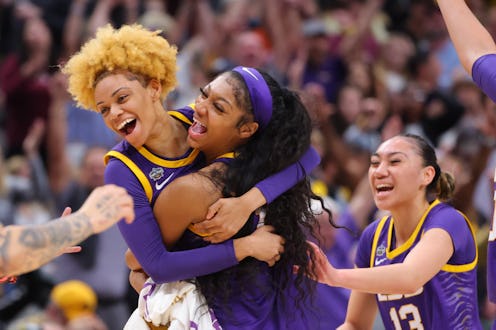Rule Breakers
This Is Their Moment
The record-setting hype around women’s college basketball comes from lifelong fans and first-timers alike, who tuned in to the Final Four matchups.

When Angel Reese addressed reporters after LSU’s 102-85 championship win over Iowa on Sunday, the college sophomore summed up her role in a history-making season in what was perhaps the understatement of the day: “I’m happy. I feel like I’ve helped grow women’s basketball this year.”
And grown it has. Sunday’s game was the most-watched of college women’s basketball of all time, according to ESPN. Roughly 9.9 million people tuned in, an 103% increase from last year’s title game. At one point on Sunday, the cheapest ticket for the women’s final was $466; tickets to the men’s game the following night were available for less than $60.
The tidal shift is happening thanks in part to players like Reese, who’ve helped captivate the nation this season. AT&T invited me to catch the Final Four action in live time, so I saw when, minutes before LSU’s post-game press conference, Reese stood at center court as confetti rained down on her and her teammates. She placed her signature tiara on her head in front of the press cameras. Louisiana State fans went wild for their star in bedazzled purple-and-gold sequin jackets.
“These really special players have been shining through, and the competitiveness of the game has everybody talking,” says Jen Britton, a former assistant coach who now serves as AT&T’s assistant vice president of national fiber sales. “I was telling someone, ‘I’m going to the Final Four game,’ and they were like, “the women’s or the men’s?’”
Reese, nicknamed “Bayou Barbie,” is one of many players bringing in first-time fans, alongside fellow All Americans like Aliyah Boston of South Carolina and Caitlin Clark of Iowa.
Clark has amassed her own fandom this season due to her uncanny ability to knock down long-range 3-point shots, one after another. The 21-year-old scored 41 points in both the Elite 8 and semifinal games, and by Sunday night, she’d set the NCAA tournament record for most points scored (191) — both for women’s and men’s hoops.
“She’s a great basketball player, and she’s fundamentally sound and fun to watch,” Britton says of Clark. “You hear people likening her to Steph Curry.” WNBA player Sabrina Ionescu summed it up similarly to ESPN: “Caitlin is having a great season, and she’s changing the game one triple-double at a time.”
These players aren’t the only reason for the unprecedented hype. First, it’s been a funky year for the men’s tournament: March Madness ticket prices are significantly down from last year, and none of the top-seeded, most talked-about teams played their way into the Final Four — the latter of which likely affected the former. Compared to the women’s tourney, their buzz feels busted.
And secondly, a series of changes have made the women’s tournament more surprising. In 2021, the NCAA changed the rules regarding its “transfer portal” — a way for players to leave their team and get picked up by another — so that athletes didn’t have to sit out a year before playing. This incentivized many to transfer, and coaches to recruit heavily from the portal.
LSU’s Kim Mulkey is one such coach, using the portal to sign players like Reese, Kateri Poole, LaDazhia Williams, Jasmine Carson, and Last-Tear Poa, all of whom played big minutes for the Tigers in the championship game.
As Mulkey’s squad proves, the result of the NCAA change is that underdogs are now turning into Cinderella stories, which hasn’t always been the case. “Before, it was always the UConns and the Tennessees of the world [who won],” Britton says. “But now we had two teams competing in the final game that had never won a national championship before.”
This moment for basketball feels almost spiritually similar to the 2019 Women’s World Cup, when the whole world seemed to collectively realize how fun women’s soccer was. Celebrities tuned in and reacted in live time. The players became bonafide superstars with fashion deals and magazine covers. They used their spotlights to advocate for long-overdue pay equality.
This week Angel Reese, who has a partnership with Coach, has already used hers to speak out about the racist coverage she’s gotten. Her activism comes at what could be a perfect moment, when first-time viewers are about to become lifelong fans.
This article was originally published on